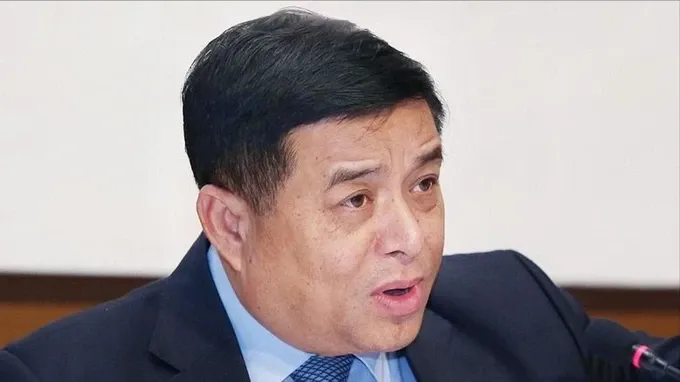
Minister Nguyen Chi Dung first listed the most critical drivers that Vietnam should prioritize from the outset of the year to achieve the 8-percent economic growth target in 2025 and aim for double-digit growth in subsequent years.
Foremost is the unity as well as the spirit of innovation and progress demonstrated by the political system under the leadership of the Party Central Committee and the Politburo. Besides that are the decisive, effective, and focused direction and management of the Government and the Prime Minister. Along with this are the dedicated efforts of ministries, agencies, localities, and the support of Vietnam’s international partners.
Furthermore, the development gains of 2024 will be consolidated and amplified in 2025. Key sectors and localities must strive for accelerated growth, exceeding the 2024 figures. Hanoi and Ho Chi Minh City, in particular, must target a 8-to-10-percent growth.
Another powerful impetus stems from the vigorous implementation of three strategic breakthroughs, the most critical of which is institutional reform, designed to unlock all available resources, particularly those currently underutilized.
Crucially, 2025 presents favorable conditions for the disbursement of public investment capital. Projects with completed investment procedures will enter their final stages, contributing directly to growth and creating new development opportunities for different regions and localities. The advantages of economic, political, and social stability, coupled with the nation’s positive growth outlook, are strongly maintained.
Finally, the dynamic expansion of new industries and sectors, innovative economic models, and emerging growth drivers such as the digital economy, green economy, circular economy, free trade zones, and international and regional financial centers will play a significant role.
Minister Nguyen Chi Dung then mentioned the five core orientations of the Party’s economic reform agenda to guide the nation into a new era of development.
- Rapid and sustainable national development will be primarily driven by science, technology, innovation, digital transformation, and green transition in order to turn Vietnam into an independent and self-reliant economy based on technological mastery and proactive international integration, market diversification. The economy's resilience and adaptability will be enhanced in the face of significant and unforeseen external shocks.
- Vietnam is determined to achieve and sustain high economic growth to become a developed, high-income nation by 2045, a goal set by the 13th Party Congress. This path, proven by countries like Japan, the Republic of Korea, and Singapore, requires sustained, potentially double-digit, growth to successfully escape the middle-income trap.
- Vietnam will accelerate industrialization, modernization, and economic restructuring, enhancing production in key industries. Digital economy, platform economy, and digital technology application across sectors will be promoted, creating new business models.
- Monetary and fiscal policies will be coordinated to stabilize the macroeconomy, control inflation, and drive growth. State budget management will prioritize development investment over recurrent expenditure. State resources will guide social capital, and the public debt ceiling will be flexibly managed to fund infrastructure development.
- Navigating global uncertainties requires focused implementation of strategic breakthroughs. Vietnam must abandon negative attitudes such as “banning a matter when it is out of control”, eliminate bureaucratic hurdles, improve the business environment, and thoroughly decentralize power. These acts are expected to clearly define responsibilities between central and local levels, empowering localities to decide, implement, and be accountable.
Lastly, the Minister stressed the key sectors to concentrate on in order for Vietnam to enter the list of developed nations by the mid-21st century and obtain a comprehensive growth with a balance between market-based economic development and the pursuit of social goals.
To take the best advantages of the opportunities presented by Industry 4.0 and digital transformation, the Party Central Committee and the Government have formulated appropriate strategies and policies based on the principle of using development to maintain stability and vice versa. Simultaneously, it is necessary to balance economic development and culture, society, environmental protection, as well as adaptation to climate change, with the first as the central task.
Specifically, regarding economic development, it is imperative to prioritize accelerating industrialization and modernization, restructuring the economy in conjunction with a renewed growth model, and enhancing the economy’s resilience. This includes developing new productive forces and innovative business models, promoting climate-adaptive economic growth models that are green, efficient, and sustainable.
Vietnam will focus on enhancing production capacity in foundational, spearhead, emerging, and supporting industries, gradually achieving self-reliance in science and technology to proactively and effectively participate in global value chains.
In terms of social development, the Government aims to develop culture and society, implement social progress and justice, and focus on improving the physical and spiritual well-being of the population. Cultural and social development must be closely and harmoniously linked with economic development.
























